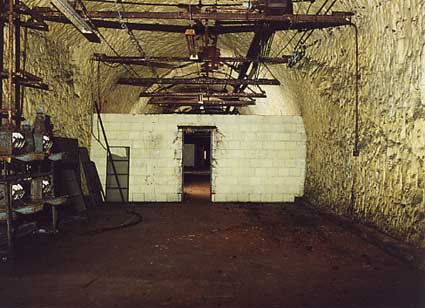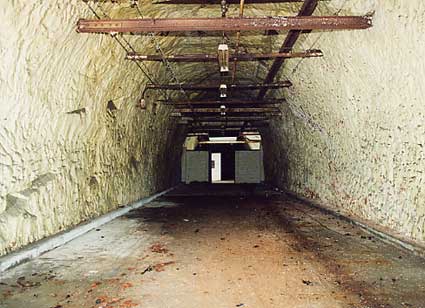|
Index
(Albert's page numbers in brackets) |
| Page 1 (1-3) |
| Page 1a (3-4) |
| Page 2 (4-7) |
| Page 3 (7-10) |
|
Page 4 (10-13) |
| Page 5 (13-15) |
| Page 6 (16-17) |
| Page 7 (18-20) |
| Page 8 (21-24) |
| Page 9 (25-27) |
| Page 10 (28-29) |
| Page 11 (30-31) |
| Page 12 (32-33) |
| Page 13 (34-35) |
| Page 14 (36-37) |
| Page 15 (38-39) |
| Page 16 (40-41) |
© 2010 Paul Stokes
Drakelow
The Diaries
of Albert Fowler Continued.....
|
BACK
Cam Sleeves were the first components to arrive at Drakelow. A few operators and Ben Mole - Foreman - came with the first coach load. The components, about 10 inches in diameter weighed several pounds, double that before heat-treatment. Thats when my labour problems started. I was a General without Troops. Not to worry, planned direction of labour was under way. The Personnel Officer duly arrived at my Bay with a crowd of folk. "Got two Polishers for you Mr. Fowler" the first of many. George Lloyd and Ben Rowley. George a married man, great war veteran - 50yrs of age. Ben, a dour black country chap. Single 35yrs old. Polishers - it showed how much Personnel knew about such things. These two chaps had but a fleeting aquaintance with Machine Polishing. No comparison with ours at all. All our work was free-hand. They were willing to learn. Some years before, when I first handled Cam Sleeves, I though my arms would drop off at the weight. I knew how they must feel when after some tuition they tried themselves out on the early ops, which were simple enough, excepting for the weight. Just the job for beginners. They got by O.K. The final op for us was a different 'Kettle of fish' To increase Engine performance and plane speed, the Sleeves had, to lighten them, been machined out beneath the Cams and 16 1" holes drilled from the body. The sharp edges had to be milled off with cutters fixed into a Morris Flexible Drive Machine and polished and a 16 thou. radius on all edges. A job on its own, and would at maximum be 20hrs a week so who-ever I started and trained for the job had it for keeps. I chose Ben and with an awful lot of coaching he finally made it. I successfully claimed for him to be exempt from call-up because of this specific job. Yes - I had the unenviable job at intervals of compiling for the National Service Officer, a list of men of military age that I could, by using older labour, women and unfit men, do without. Ben had, without knowing it, made himself indispensible. It was a long struggle to get him down to it. I learned a lot in the process. As I said earlier, our work was free hand. Feel touch and judgement all came into it. To radius tire edges of 16 1" holes, 60 thous doesn't sound much. When you come to do it, and with unskilled trainee labour it is not so easy. Tough hardened steel too. The Morris Flex Machines were suspended above the operators head, a Flexible Drive draped over the shoulders into the hands. A 1/4" collet held spindles that carried cutters, leather and felt bobs dressed in emery, and emery mops, and split end spindle to hold bits of emery cloth. Cutters were cone shaped 5/8" X 3/4". Sweep of the arm round half the hole, pivot the cam sleeve, cut the other half 32 times. i.e. both sides of 16 holes. Plenty of room for error. If in milling too much metal is taken off, that is it, You can't put it back. Next, Leather Bobs dressed in glue and rolled in emery. Coarse to smooth according to the stage in operation. These Bobs, mushroom shaped to enable them to be pressed face downwards to the milled hole, removed the milling marks and using judgement and the 60 thou guage provided, produce the required radius. Sounds easy, and it is, once it had been mastered. The radius had to be even all round, View was 100%. The Lightening Pockets were polished on the lathes. Normally at No.1 this was done by a Polisher. Here with less of this component I decided to train one man for both jobs. It is always a risk, having all your eggs in one basket, but as it turned out luck was on my side. Ben did that job for three years. He almost gave up in despair on those Lightening Pockets. He had never worked on a Lathe and it took ages for him to shape the bobs right, to hold the sleeve at the right angle without taking metal off in the wrong place. "I'll never be able to do it" he said. I made the tools for him and showed him again and again. There was plenty of time thank goodness, before other components came along, so I could devote all my time to these two chaps. Later when I got a few skilled men from No.1 it was easier, Nearly all the other jobs were done by more than one man. Put the trainee on the same Lathe as the skilled man (Polishing Lathes are two ended, right and left hand) and by watching for a while, having a try at the discretion of the experienced man and in no time, on the easier jobs they were capable of standing on their own. Trade Unions had co-operated in this dilution
of skilled labour. I never had much opposition from my chaps in
helping to make it work, some indeed, found pride in getting their
man down to it. I had to ensure they didn't lose financially by
it. I did many unethical things and nobody interfered. Quote Ernie
Wooldridge the Works Machine Shop Supervisor and General Manager
"Albert, I know nothing about your job, as long as your department
goes along alright, I'll never interfere." He never did either.
We settled all our problems in the shop. Trainees were on a fixed
rate. All Polishers being piecework. Prices had been fixed on
"Pegasus" and "Mercury" engines from the start of the job at No.1
Factory. The Trainee stayed day work until I decided he could
make more peacework. As an incentive for the skilled man, I allowed
him unofficially to book any work done, either in part or complete
by the Trainee. Timing the separation was a delicatly balanced
decision in as much as one wanted to be certain that the new man
would be able to earn a wage, and the teacher hadn't lost out
and in consequence would accept another trainee if approached.
If I seem to have over-elaborated the problem, one man for one
job, it is first to give to those who have never worked on a large
engineering works some insight into what it is like. Secondly
to point out that in the context of polishing an aero engine,
we were precision workers. Engineers in fact. Skilled Polishers
up until now had been recruited for this work. Some of them Ben, the dour one's, hobbies and main interest was Pigeons. Get him on that subject and on the races at the week-end, also Pigs and Apple growing, and he was a revelation. A mine of knowledge. He taught me a lot. I hope I was able to teach him something. I always had a soft spot for Ben. Some years later, (1946) I met a Foreman at one of Ford's experimental Depots. He told me he was looking for a Morris Flex man for special work. I recommended he got in touch with Stourbridge Labour Exchange. Ben lived somewhere near there, and to offer him the job. Ben was traced, but refused to go to Fords. I can understand it. You had to talk to Ben, establish a relationship. These first two chaps had been working nights together and liked it. They were the first on nights for me, when as production grew a night shift was established at the works. This then was the pattern of my approach to all, and there was a multitude of unskilled directed labour I had through my department during the next three years. It worked, I made friends (I hope) with all. How else could it be when in many cases we worked, played and ate together, both inside and outside the works. A lesson in living, that to me, a 'loner' was a revelation. Some of my old workmates from No.1 seemed happy working under me. Polishers are very conservative in who they work for. Extreemly loyal when once they have decided. To sum up - my job was - with a nucleus of skilled men - to arrange the basic training of the un-skilled - to asses their capabilities - use them to the best advantage -to encourage and instill the necessary confidence in men and women who had no knowledge or experience of the type of work they had been directed to. I rated the job as more difficult than that of the Foremen in the Machine shop, whose task was simply to get them to work machines. Mine had to develop hand skills and work to a fine limit. Some of my girls more used to carpet looms
called the lathes - frames - the name for the machines on their
peace-time jobs. Joe Ridley on one of his rare visits, said "You've
done well" The only intimation I ever had that my department was
running to schedule, and that after 18 months of steady rising
production. The Management must have had confidence in me, whenever
a Foreman was absent in another Process Dept. Mr. Bowden - Production
Chief, together with whoever was Works Manager at the time, would
ask me to take over. At one time I had three departments. Shotblast,
Fettling and my own. I never had the slightest difficulty, I always
had a good relationship with all the chaps working for me and
it spread to the other sections. Strange when you think what a
'loner' I was. The Tool Room boys were all young men, good technicians,
they had to be, being reserved from Military Service at 25yrs
of age. |
|||
![]() Back
to home page
Back
to home page ![]() Drakelow
Unearthed
Drakelow
Unearthed
© All photographs on this site
are protected by copyright law.
They may not be reproduced
in any form or location electronically or in print without prior written
permission from the copyright owner.

